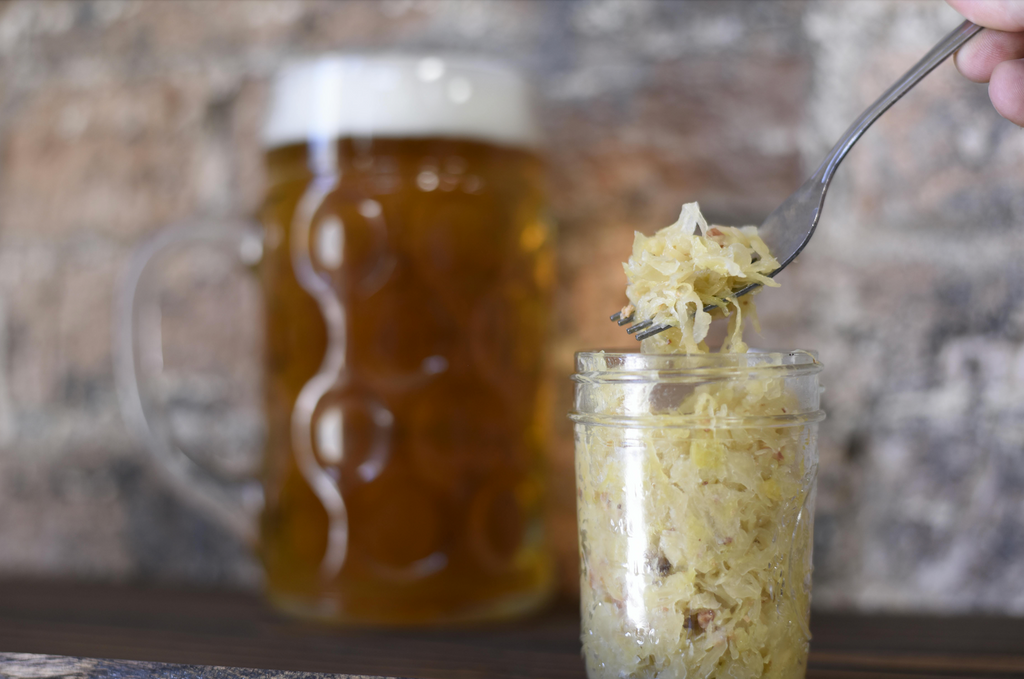If like me, you’re a cross between a news nerd and a fermentation freak. You’ll have noticed a big trend over the past few years. The rise in media coverage of fermented foods such as sauerkraut, kimchi, yoghurt, kombucha, pickles and others both familiar and unfamiliar.
The number of news items, magazine articles and even television programs on the topic seems to have quadrupled recently. This has occurred as the media rushes to satisfy the public’s demand for more information about fermentation and gut health.
Just a quick look at the local health food shops has also shown an increase in fermented products on the shelves. Even supermarkets are now stocking a fermented range along with some organic products.
Traditionally fermented products such as wine and cheese have always been an important part of our diet. Indeed, look closely enough and you’ll find the so-called domestication of microbes has been part of almost every society’s history. Originally used to preserve food over the colder months when growing wasn’t possible, fermentation played a major role in keeping societies fed.
But it’s the more recent explosion of interest in these other fermented foods and drinks that is remarkable.
So how did this “new awareness” on the benefits of fermenting begin?
Here are a few ideas.
Mainstream media articles
Fermentation has always been around, bubbling just under the surface, to draw a mischievous analogy. Indeed sauerkraut has been an important part of diets for centuries in countries as diverse and far apart as China, Germany and Korea.
In Korea for example, kimchi is a favourite food. Like a spicier version of sauerkraut, it is considered more than just sustenance. It’s part of the country’s culture and identity. Kimchi festivals at the village level abound. Great pride is taken in making the finest examples of the national food.
The media through TV, radio, magazines, web publications (and increasingly podcasts) has reported and published scientific findings on the benefits of a balanced gut microbiome. It would have been hard to find an article in the mainstream press in Australia on fermentation just a few decades ago. Now the subject is everywhere (just try Googling “fermented foods”).
The first time I recall seeing fermentation’s benefits with regard to gut health was on an episode of the ABC science show Catalyst. It was the first time I realised how important the microbiome was to our overall health. The program’s episode gave a hint of the value of a diet high in probiotics. Just as importantly it showed the changing perception of a health diet
Our changing perception of bacteria
We are inundated with commercials every day, pressuring us to destroy any bacteria in the house. The mainstream message is always the same: any bacteria is bad bacteria by definition. It must be destroyed by the latest cleanser, disinfectant or sanitiser.
It’s true that bad bacteria does exist, and it’s important to keep places clean, and hands washed and sanitised, particularly during an epidemic. However, too much cleansing may mean we risk destroying the good bacteria as well.
But perceptions have changed over the last decade or so. We have shifted our idea that all bacteria is bad, to one where we acknowledge the presence of good bacteria. Many also have a better idea of the importance of a healthy gut. People understand that by eating a diet high in fermented foods, we may help increase the consumption of these beneficial microbes.
More general awareness of our health and the need to save our planet
The growth in general awareness of our ancient pals the microbes is also associated with a better appreciation of the environment and a better understanding of what we need to do to preserve it. One of these is a move towards a zero-waste lifestyle. This ethos holds that we use and reuse material as much as possible and reduce (or recycle where available) waste in the kitchen.
Becoming more aware of preserving our precious planet leads to thinking about doing the best we can for our health. Chief amongst this may well be a better understanding of the benefits of gut health. Hand-in-hand with this may be a better knowledge of how fermented foods, with their beneficial probiotics, help restore the balance of the bacteria in the gut microbiome.
More and more people appear to be coming to the belief that the standard, high sugar, highly-processed diet is inadequate for our health. They are looking for healthy alternatives with fermented foods well in the mix. (Remember all the photos of homemade sourdough during the pandemic lockdown?)
Our philosophy, the one we are guided by, is that fermented foods are healthy, but always as part of a well-rounded, healthy diet.




